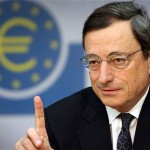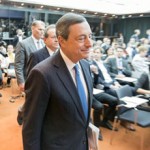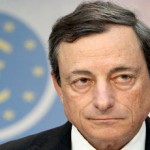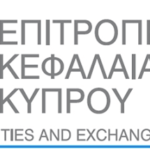Draghi Sets Clock Ticking for June Stimulus by ECB
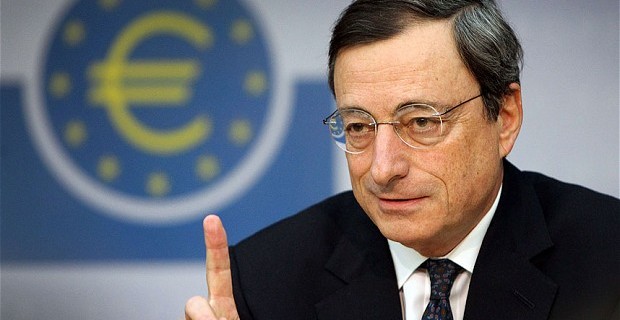
Mario Draghi has given himself a month to craft a new fix to the European Central Bank’s deflation angst.
Cutting the euro area’s benchmark interest rate to a record tops the list of options for the ECB President after he lined up fresh monetary stimulus for June. Other potential measures include charging banks to park cash at the institution, loaning them more cheap money and a fresh push to revive lending.
Draghi’s declaration yesterday that officials are “comfortable” about taking further action if needed, and his increased irritation with a stronger euro, suggest he is giving up hope that an economic recovery will address the Japan-style deflation threat for him. It also pushes the bank closer toward the quantitative-easing policy that it has long rebuffed but may still have to deploy if his worst-case scenario plays out.
“The debate seems to be on what policy measures to take, and not on whether to take any at all,” said Elga Bartsch, chief European economist at Morgan Stanley in London.
Draghi’s exasperation with low inflation prompted economists from Morgan Stanley to ABN Amro Bank NV to predict policy makers will cut their key rate to 0.10 percent from 0.25 percent when they convene on June 5 and have access to new staff economic forecasts.
Words Into Action
Bond investors, already pouring cash into the region’s debt markets this year, responded to the prospect of further stimulus by pushing down yields of Spanish, Italian and German 10-year bonds. Spain’s bond yield touched an all-time low of 2.875 percent, and Italy’s fell as low as 2.912 percent, the least since Bloomberg started tracking the securities in 1993.
The ECB “will finally turn words into action,” said Nick Kounis, head of macro research at ABN Amro Bank NV in Amsterdam. ‘The triggers for the ECB appear to be a combination of persistent euro strength and lower than expected inflation.’’
Inflation is less than half the ECB’s target of just under 2 percent. Consumer prices rose 0.7 percent in April from a year earlier.
Exacerbating concern that the euro region risks deflation, the currency has climbed 8.4 percent since July against the dollar, squeezing exporters and restraining import prices. In his toughest rhetoric yet, Draghi yesterday called the euro’s climb a “serious concern,” a warning that pushed the exchange rate down from the $1.40 level it almost breached earlier in the day.
Harder Tone
The ECB president’s harder tone follows mounting international pressure to tackle what the International Monetary Fund dubs “lowflation,” a prolonged period of sluggish price increases. The Organization for Economic Cooperation and Development this week echoed the IMF in calling for an interest-rate cut for the euro area.
As well as reducing its main rate, the ECB may push its so-called deposit rate into negative territory, said Marco Valli, chief euro zone economist at UniCredit Global Research in Milan. That would leave banks paying to leave cash in the ECB’s coffers overnight, providing them with a reason to lend money to companies and consumers instead.
Any reduction in the deposit rate may still be small given a cut could backfire by hurting the balance sheets of banks and forcing them to pull back lending even more, said Valli.
A 10 basis-point reduction in the currently zero rate “would allow the ECB to send a signal to the market, while minimizing the unintended consequences of such a move,” he said.
Credit Availability
The ECB could also try to boost credit availability in the economy, where lending by banks to households and companies fell 2.2 percent in March, said Philip Shaw, an economist at Investec Securities Ltd.
Draghi has hinted the ECB is studying how to stimulate the European market for asset-backed securities, which packages individual loans such as mortgages or auto-credit and sells them to investors.
Still, such purchases “would not directly address the problem of the strength of the euro” so are unlikely, said Heinrich Bayer, an economist at Postbank AG in Bonn.
At Citigroup Inc., economist Guillaume Menuet said a June rate cut will mark only the start of a series of actions as inflation continues to disappoint. It will likely be followed by a halt to the draining of liquidity added by crisis-era bond purchases, the introduction of long-term loans for banks tied to lending to small and medium-sized businesses and ultimately quantitative easing in the final weeks of the year.
“I don’t think there’s any chance for inflation getting close to target any time soon,” he said. “QE will follow when everything else has been tried and not proved successful.”
Source: bloomberg









